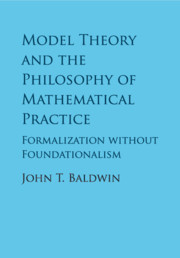Introduction
Published online by Cambridge University Press: 19 January 2018
Summary
The announcement1 for a conference on Philosophy and Model Theory in 2010 began:
Model theory seems to have reached its zenith in the sixties and the seventies, when it was seen by many as virtually identical to mathematical logic. The works of Gödel and Cohen on the continuum hypothesis, though falling only indirectly within the domain of model theory, did bring to it some reflected glory. The works of Montague or Putnam bear witness to the profound impact of model theory, both on analytical philosophy and on the foundations of scientific linguistics.
My astonished reply to the organizers began:
It seems that I have a very different notion of the history of model theory. As the paper at [Baldwin 2010] points out, I would say that modern model theory begins around 1970 and the most profound mathematical results including applications in many other areas of mathematics have occurred since then, using various aspects of Shelah's paradigm shift. I must agree that, while in my view there are significant philosophical implications of the new paradigm, they have not been conveyed to philosophers.
This book is an extended version of that reply to what I will call the provocation. I hope to convince the reader that the more technically sophisticated model theory of the last half century introduces new philosophical insights about mathematical practice that reveal how this recent model theory resonates philosophically, impacting in particular such basic notions as syntax and semantics, structure, completeness, categoricity, and axiomatization. Thus, large parts of the book are devoted to introducing and describing, for those not familiar with model theory, such topics as the stability theoretic classification of first order theories, its applications across mathematics, and that its interaction with classical algebra is inevitable (Chapter 5.6). Much of this exposition will be in the context of discussing the paradigm shift. In short, the paradigm around 1950 concerned the study of logics; the principal results were completeness, compactness, interpolation, and joint consistency theorems. Various semantic properties of theories were given syntactic characterizations but there was no notion of partitioning all theories by a family of properties.
- Type
- Chapter
- Information
- Model Theory and the Philosophy of Mathematical PracticeFormalization without Foundationalism, pp. 1 - 28Publisher: Cambridge University PressPrint publication year: 2018



